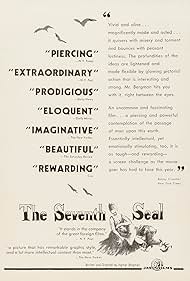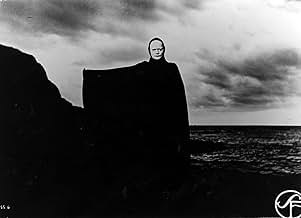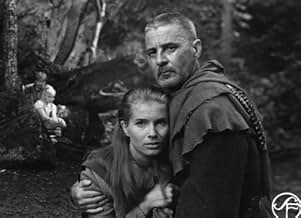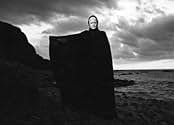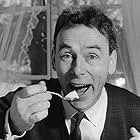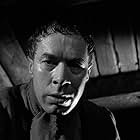A knight returning to Sweden after the Crusades seeks answers about life, death, and the existence of God as he plays chess against the Grim Reaper during the Black Plague.A knight returning to Sweden after the Crusades seeks answers about life, death, and the existence of God as he plays chess against the Grim Reaper during the Black Plague.A knight returning to Sweden after the Crusades seeks answers about life, death, and the existence of God as he plays chess against the Grim Reaper during the Black Plague.
- Awards
- 9 wins & 2 nominations total
Siv Aleros
- Flagellant
- (uncredited)
Sten Ardenstam
- Knight
- (uncredited)
Harry Asklund
- The Landlord
- (uncredited)
Benkt-Åke Benktsson
- Merchant at the Inn
- (uncredited)
Summary
Reviewers say 'The Seventh Seal' delves into mortality, faith, and existential questions through its medieval setting. The chess game with Death symbolizes humanity's struggle against fate. Themes of societal chaos and religious fervor are depicted through plague, witch burnings, and flagellants. Characters like the knight, squire, and actors provide varied perspectives on life and death, enriching the narrative. The film's allegorical approach resonates with contemporary audiences, highlighting the timeless nature of its themes.
Featured reviews
10Xstal
An abstraction of your fears, conjured progressively through years, walks beside you every day, may cause some to halt, then pray; it's a demon that's passed on, through generations come and gone, as fixed and certain as the tide, nowhere for you to run, or hide; is there a game that you can play, that extends your time and stay, with instructions and some rules, that don't leave you, as the fool; can the clock that's counting down, tick half as fast before you frown, and gaze with stoical askance, as you begin, your macabre dance.
Signed, sealed and delivered as many times as you may care for, but the curse of existence is never knowing how the story really ends, or why it was started in the first instance.
Signed, sealed and delivered as many times as you may care for, but the curse of existence is never knowing how the story really ends, or why it was started in the first instance.
One thing that can be certain after watching the Seventh Seal, outside of being thankful for living in this century, is that Bergman knows his film-making- and imagery. He uses subliminal and not so subliminal techniques to convey a dying, frightened world, where making a living is almost impossible and the debate of god's control over life is discussed like un-rhyming yet fascinating poetry.
The result is beautiful cinema, capturing the always foreboding fear and allure of the almighty and for the waiting death, appropriately staged in post-crusades, mid dark age Europe. Max Von Sydow gives an excellent showing as the opponent of Death (in a clever and meticulous chess game), yet the character of Death, played by Bengt Ekerot with chilling conviction, steals the show, if only for the alluring quality of the character.
Even if the story veers it veers in good and interesting territory, focusing on people who convey Bergman's point and or style. I can't reveal what the bottom line point is (many newcomers to Bergman's work won't either, especially if you're not in the mood for soul searching), but one thing is for certain, an allegory on life and death is shown perfectly in the second to last shot of the reaper and his minions following in a dance across the field. This is one of the most pure of cinema's masterpieces and certainly Bergman's best cine. A++
The result is beautiful cinema, capturing the always foreboding fear and allure of the almighty and for the waiting death, appropriately staged in post-crusades, mid dark age Europe. Max Von Sydow gives an excellent showing as the opponent of Death (in a clever and meticulous chess game), yet the character of Death, played by Bengt Ekerot with chilling conviction, steals the show, if only for the alluring quality of the character.
Even if the story veers it veers in good and interesting territory, focusing on people who convey Bergman's point and or style. I can't reveal what the bottom line point is (many newcomers to Bergman's work won't either, especially if you're not in the mood for soul searching), but one thing is for certain, an allegory on life and death is shown perfectly in the second to last shot of the reaper and his minions following in a dance across the field. This is one of the most pure of cinema's masterpieces and certainly Bergman's best cine. A++
Death, Death, Death. No matter the moves you make, Death will, in time, have you in checkmate. The Seventh Seal is a rightfully highly regarded film. It is a unique film, and unlike any I have ever seen. I have just finished my second viewing of the film. I have watched several Bergman films since I first saw this, but this is the one that has always stuck out to me the most. I would describe it as a dark and powerful film. There is nothing lacking in this film, in my opinion. The soundtrack is perfectly subtle, acting is agreeable, cinematography fitting and well done, etc. My favorite aspect of this film is simply the premise. A game of chess that is a matter of life and death. If nothing else, that concept is enough to make an interesting film at the very least. Death is the most persistent theme throughout the film, and is often juxtaposed to stark scenes of life, often quickly and without warning. This film was one of the first I watched in my everlasting pursuit of classic cinema, and I would readily recommend it as a starting point for anyone interested in classic or foreign films. Bergman will not disappoint in this one or elsewhere in his filmography. This is probably his most famous and accessible films. This is a staple of classic cinema, watch it and find out why.
Painting a grim portrait of the western world plagued by the Black Death, threading together several norms of the medieval era into a single setting, and addressing its themes by observing them through contemporary lens, The Seventh Seal is a fable of life, death, religion, faith & existential angst that, despite the allegorical treatment, makes sure its narrative remains somewhat accessible.
Written & directed by Ingmar Bergman, one of the first things that stands out about this sermon is the dark & deathlike atmosphere the plot comes drenched in. Add to that, the whole premise of playing chess against the Grim Reaper with one's life on the line sounds interesting on paper. The story however piles on more subplots and digs deeper into the philosophical & spiritual elements that only slow down the ride.
The crisp black n white cinematography is captivating throughout. Characters of all moods are present in the picture. The period details may not be appropriate but the gloomy aura is finely captured. And comfortably steering the film past the finish line are the sturdy performances, led by Max von Sydow who plays a knight locked in a game with Death itself, latter personified by Bengt Ekerot. And the scenes between the two are easy standouts.
Overall, The Seventh Seal is actually easier to navigate than what I was expecting, and the parallels viewers can draw between the medieval pandemic and one we're dealing with currently makes the journey rather intriguing. Nonetheless, the relaxed pace & numbing speeches still made it a frustrating sit for me and failed to strike an emotional chord. As is the case with previous Bergman entries, I do get its legacy & repute but don't feel any personal love for it.
Written & directed by Ingmar Bergman, one of the first things that stands out about this sermon is the dark & deathlike atmosphere the plot comes drenched in. Add to that, the whole premise of playing chess against the Grim Reaper with one's life on the line sounds interesting on paper. The story however piles on more subplots and digs deeper into the philosophical & spiritual elements that only slow down the ride.
The crisp black n white cinematography is captivating throughout. Characters of all moods are present in the picture. The period details may not be appropriate but the gloomy aura is finely captured. And comfortably steering the film past the finish line are the sturdy performances, led by Max von Sydow who plays a knight locked in a game with Death itself, latter personified by Bengt Ekerot. And the scenes between the two are easy standouts.
Overall, The Seventh Seal is actually easier to navigate than what I was expecting, and the parallels viewers can draw between the medieval pandemic and one we're dealing with currently makes the journey rather intriguing. Nonetheless, the relaxed pace & numbing speeches still made it a frustrating sit for me and failed to strike an emotional chord. As is the case with previous Bergman entries, I do get its legacy & repute but don't feel any personal love for it.
Antonius Block - "Who are you?" Death - "I am Death." Antonius Block - "Have you come for me?" Death - "I have long walked by your side." Antonius Block - "So I have noticed."
The Seventh Seal, considered by some to be Ingmar Bergman's greatest achievement, is the desperate prayer of a sensitive, introspective, and insightful young man confused by the horrors of the world around him. Ingmar Bergman's films are often very deep, full of symbolism, philosophy, spirituality, emotion, and thought. The Seventh Seal is classic Bergman. Expressing his fear of life with no meaning, death with no understanding, and faith with no validity, Ingmar Bergman takes us deep into the well of his mind.
As the Black Plague ravages the world, a Antonius Block and his squire, Jons (Max Von Sydow and Gunnar Bjornstrand, respectively), return from fighting in the Crusades. They find their homeland devastated by the plague, their countrymen mad with fear, and their cause lost. Antonius Block is confronted by Death (Bengt Ekerot). Block challenges Death to a game of chess to provide him time to seek answers to the questions that plague his mind as Death has plagued his country. Death accepts, knowing that Block cannot escape his fate, and the two begin their game. As the story continues, Block and Jons meet with several testaments to the agony that the Black Death has brought upon their land. They find a young girl who is to be burned at the stake for having been with the Devil. They find madness in the eyes of all they meet, as everyone is convinced that God is angry and is punishing the world with the plague. They also find a small group of travelling actors, who appear to be the only souls to have remained sane in the midst of all of the death and fear. Block and Jons move across the countryside in the hopes of finding safety in Block's castle, but Death is always around the corner, biding his time.
Brilliantly conceived, and stunningly executed, Bergman's vision is brought to the screen through Gunnar Fischer's powerful cinematography creating images that will likely remain with you for the rest of your life. Strong performances from everyone involved bring humanity to the film. Max Von Sydow's brave and conflicted Antonius Block matching wits with Bengt Ekerot's sinister, omnipotent Death is a microcosm of the forces at work in this breath-taking interpretation of the mortal struggle.
A masterpiece!
The Seventh Seal, considered by some to be Ingmar Bergman's greatest achievement, is the desperate prayer of a sensitive, introspective, and insightful young man confused by the horrors of the world around him. Ingmar Bergman's films are often very deep, full of symbolism, philosophy, spirituality, emotion, and thought. The Seventh Seal is classic Bergman. Expressing his fear of life with no meaning, death with no understanding, and faith with no validity, Ingmar Bergman takes us deep into the well of his mind.
As the Black Plague ravages the world, a Antonius Block and his squire, Jons (Max Von Sydow and Gunnar Bjornstrand, respectively), return from fighting in the Crusades. They find their homeland devastated by the plague, their countrymen mad with fear, and their cause lost. Antonius Block is confronted by Death (Bengt Ekerot). Block challenges Death to a game of chess to provide him time to seek answers to the questions that plague his mind as Death has plagued his country. Death accepts, knowing that Block cannot escape his fate, and the two begin their game. As the story continues, Block and Jons meet with several testaments to the agony that the Black Death has brought upon their land. They find a young girl who is to be burned at the stake for having been with the Devil. They find madness in the eyes of all they meet, as everyone is convinced that God is angry and is punishing the world with the plague. They also find a small group of travelling actors, who appear to be the only souls to have remained sane in the midst of all of the death and fear. Block and Jons move across the countryside in the hopes of finding safety in Block's castle, but Death is always around the corner, biding his time.
Brilliantly conceived, and stunningly executed, Bergman's vision is brought to the screen through Gunnar Fischer's powerful cinematography creating images that will likely remain with you for the rest of your life. Strong performances from everyone involved bring humanity to the film. Max Von Sydow's brave and conflicted Antonius Block matching wits with Bengt Ekerot's sinister, omnipotent Death is a microcosm of the forces at work in this breath-taking interpretation of the mortal struggle.
A masterpiece!
Did you know
- TriviaIngmar Bergman credited the film with helping him overcome his crippling fear of death. Because the film dealt so overtly with the subject, he found it a highly cathartic experience.
- GoofsThe chess players focus on capturing the Queen. The Queen was not a super-powerful piece until centuries later when a recent chess-variant initially called "chess of the mad queen" became more popular than the classic game.
- Quotes
Antonius Block: We must make an idol of our fear, and call it god.
- ConnectionsEdited into Severed Ways: The Norse Discovery of America (2007)
Details
- Release date
- Country of origin
- Languages
- Also known as
- El séptimo sello
- Filming locations
- Hovs Hallar - Naturreservat, Skåne län, Sweden(Opening beach scene and ending scene)
- Production company
- See more company credits at IMDbPro
Box office
- Budget
- $150,000 (estimated)
- Gross worldwide
- $312,104
- Runtime1 hour 36 minutes
- Color
- Aspect ratio
- 1.37 : 1
Contribute to this page
Suggest an edit or add missing content

